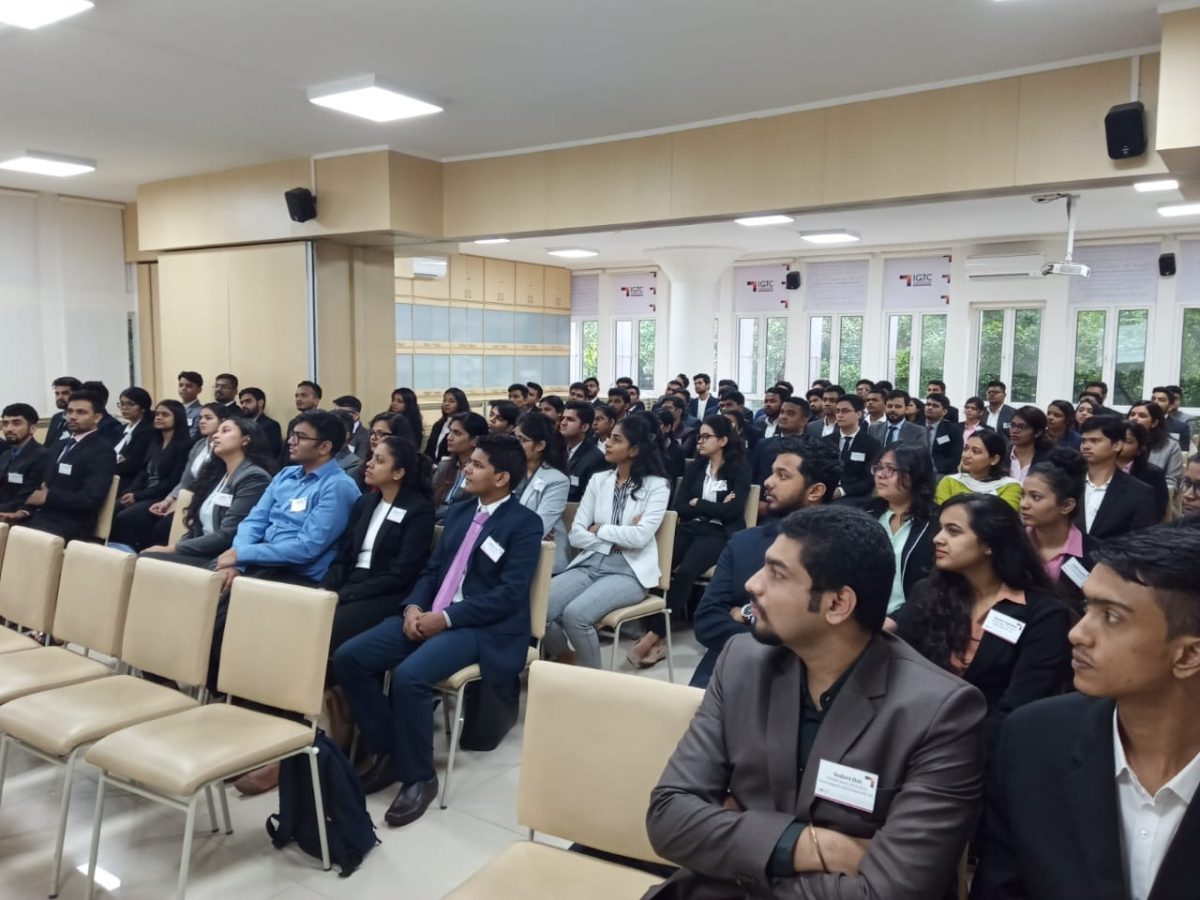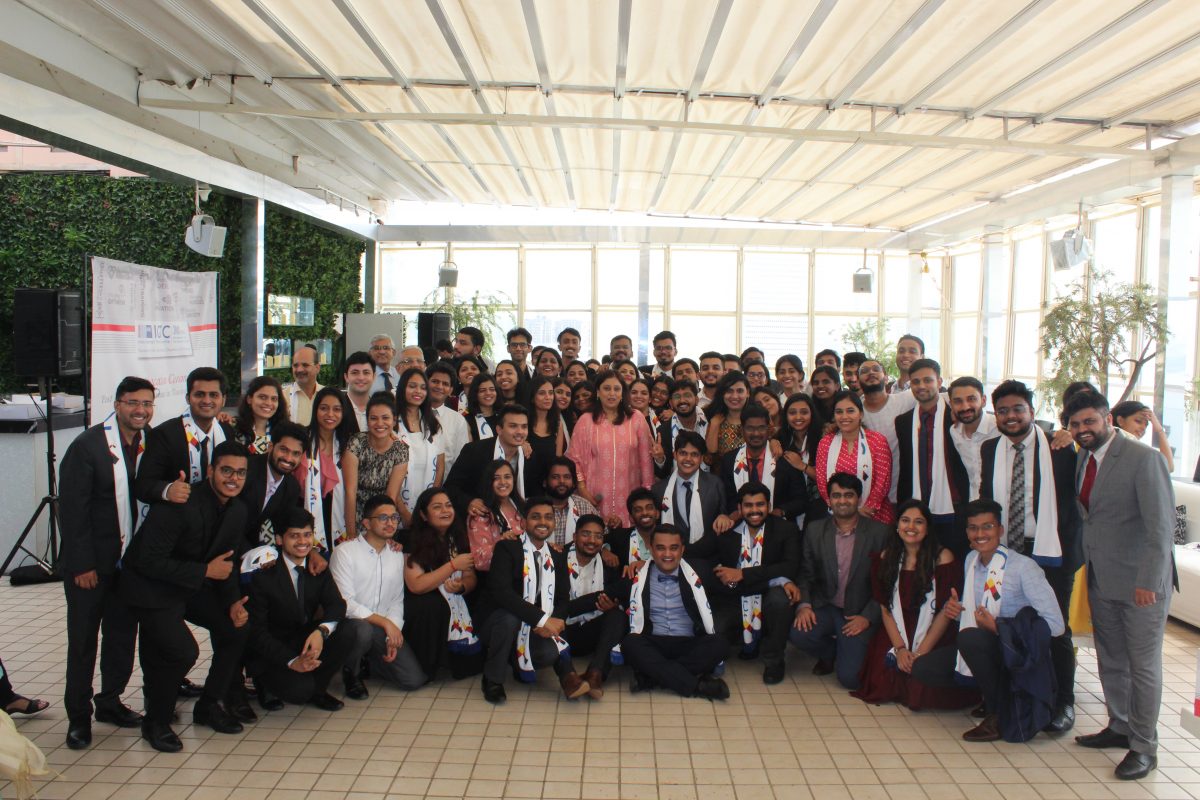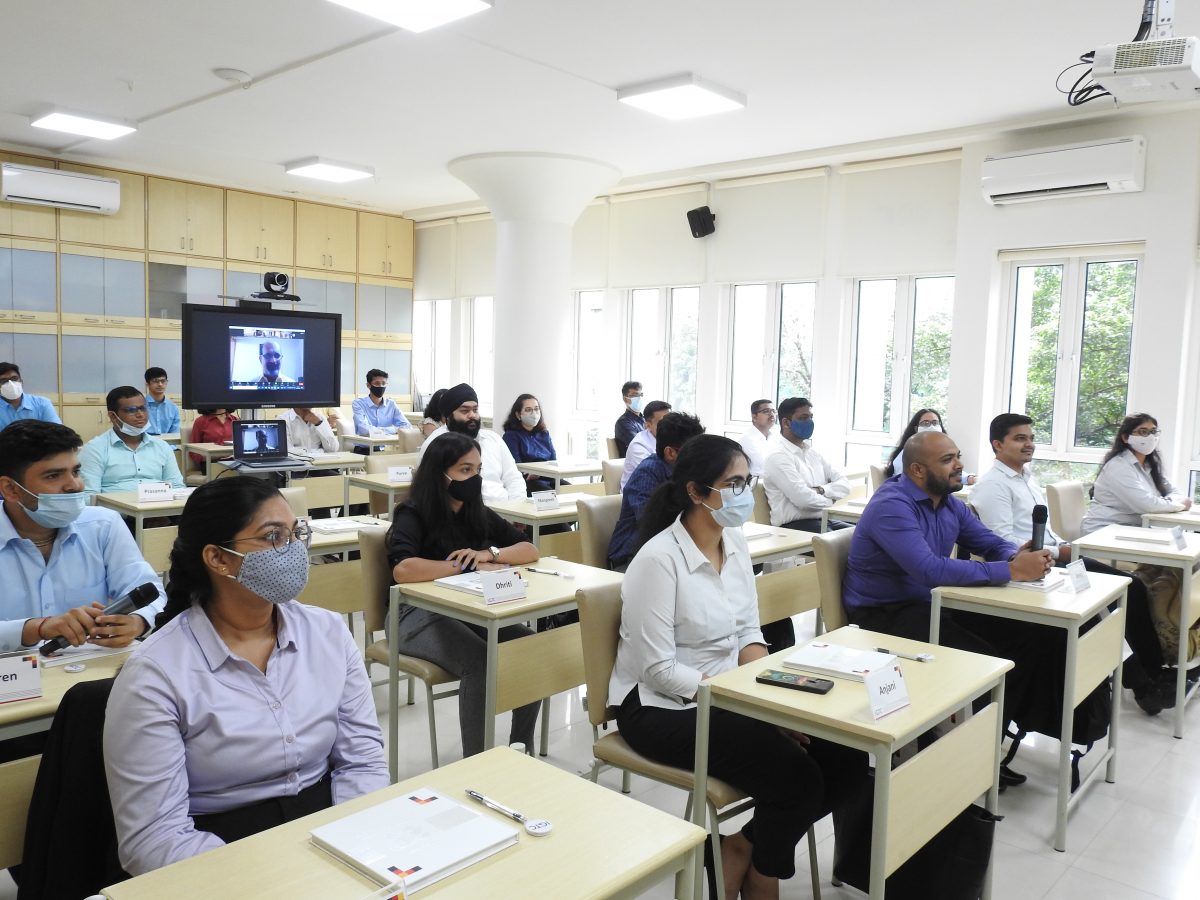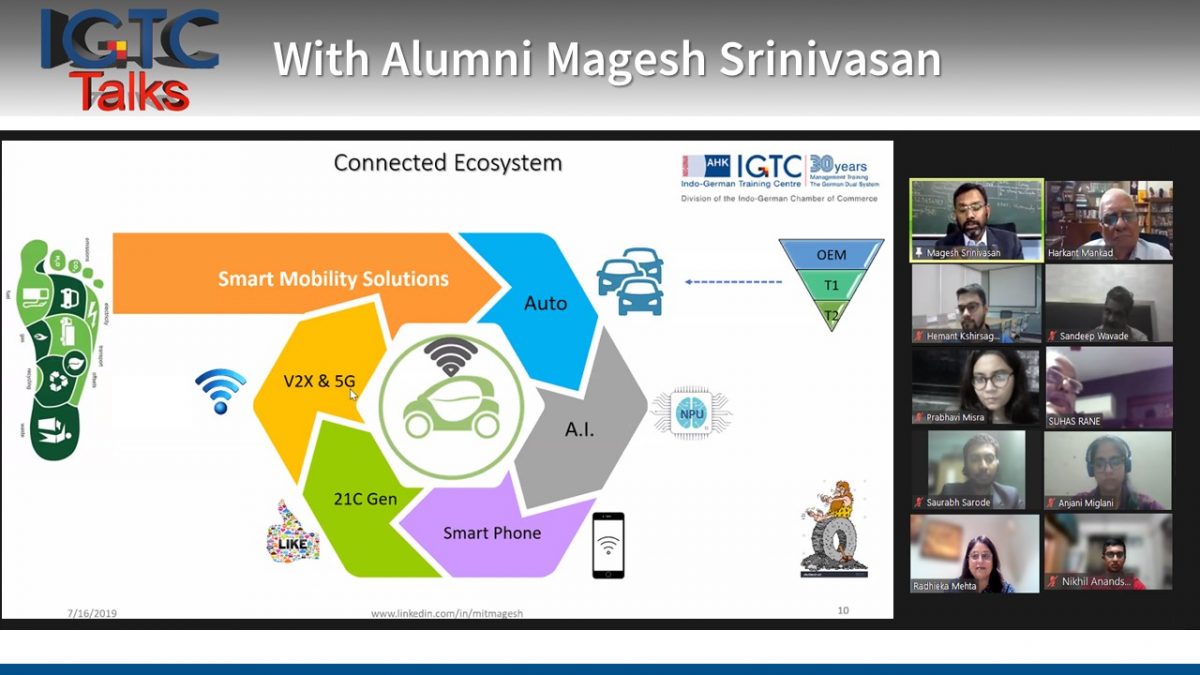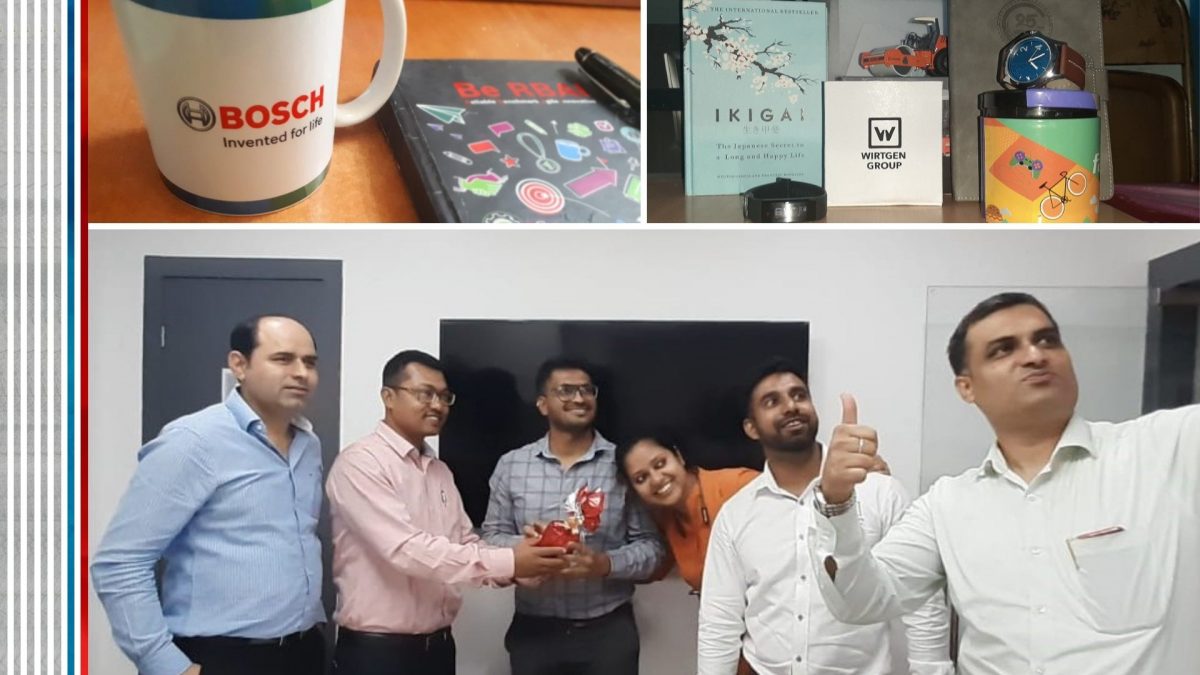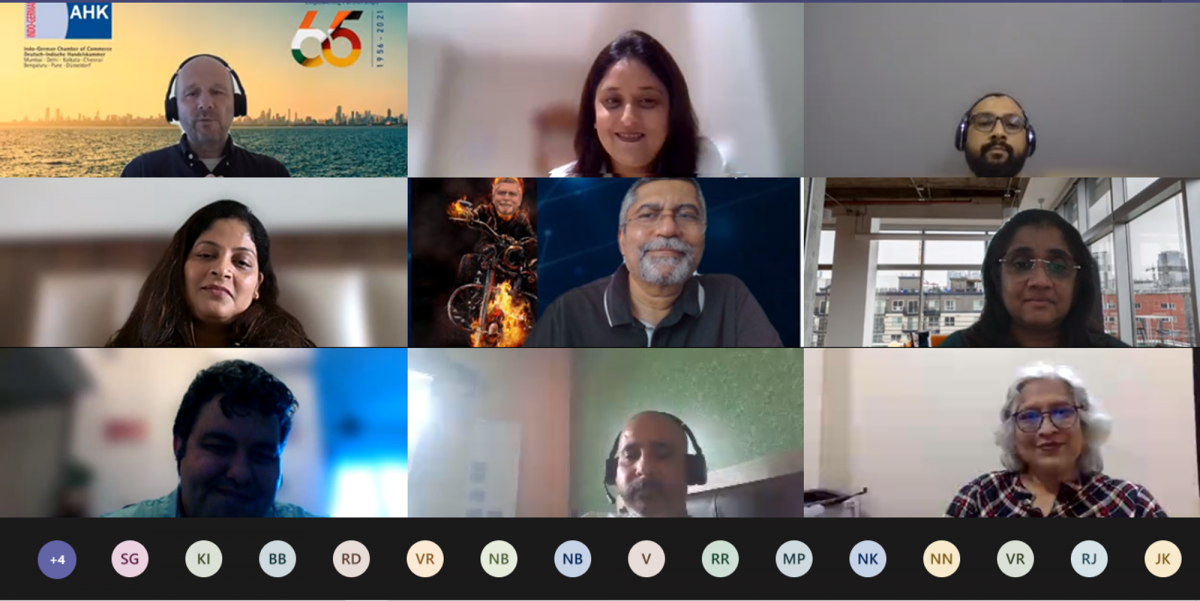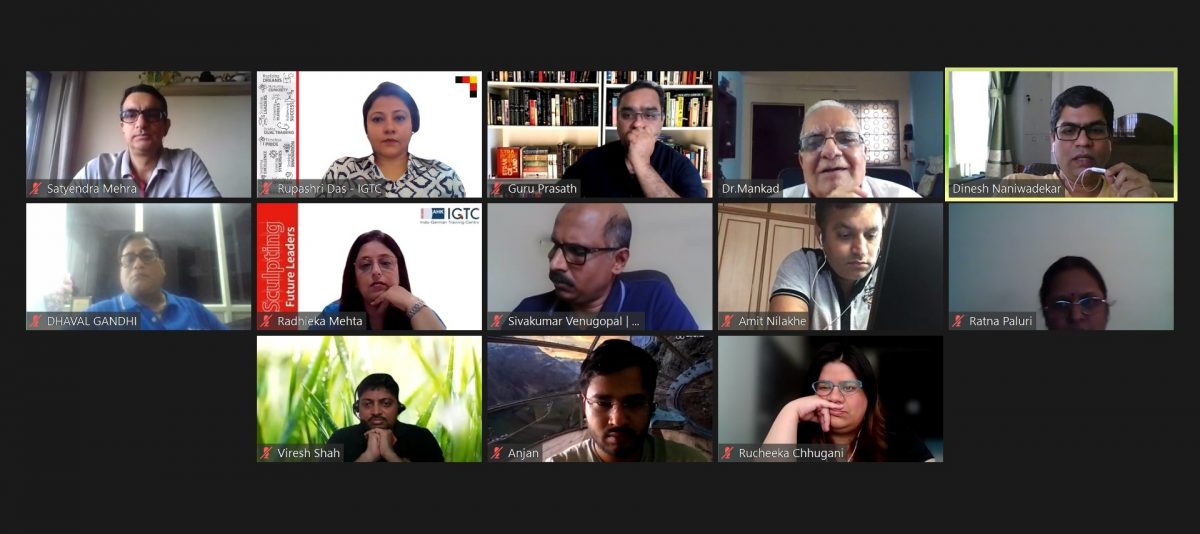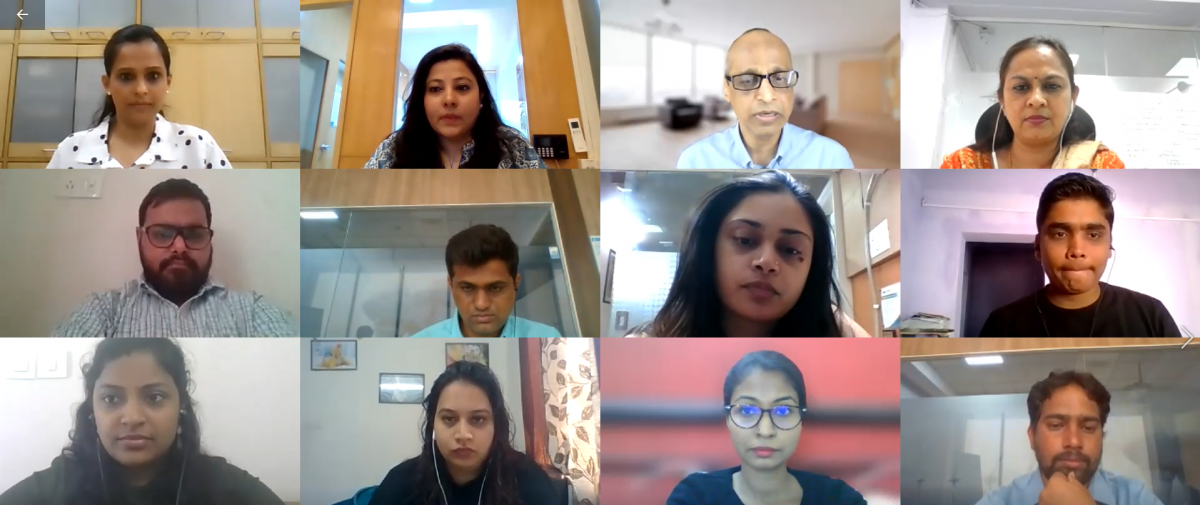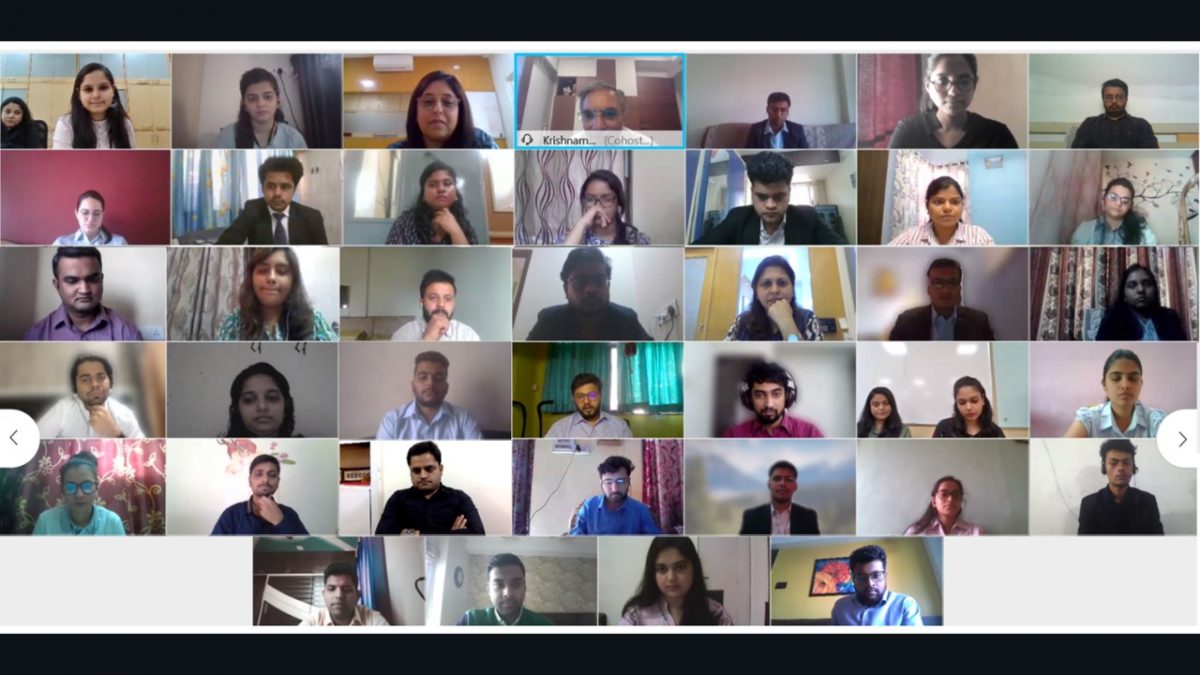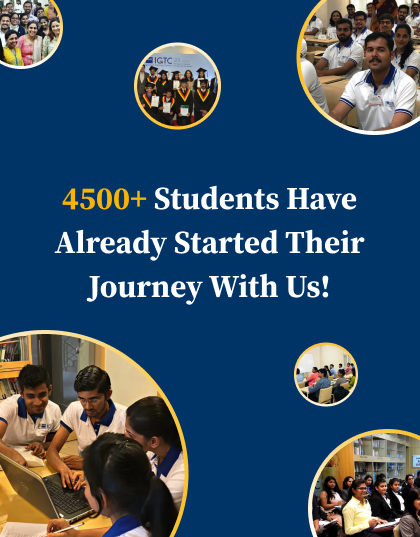Testimonials
Dreams come true!
Believe me, dreams do come true, they come true at IGTC, you should only have the persistence and drive to pursue them.
Simple or complicated, we are all dreamers. Fuelled by dreams IGTCians are challenged to turn these dreams into happy realities. From being acquainted with industry stalwarts to trainings at mammoth partnering companies to working on projects challenging yet exciting, the world here is a playground. By striking the right balance between theory and practice IGTC has moulded young trainees to fit seamlessly into the corporate world.
Here is one look at the roads and the destinations of the Post-Graduate Programme in Business Administration Batch of 2019-2021.
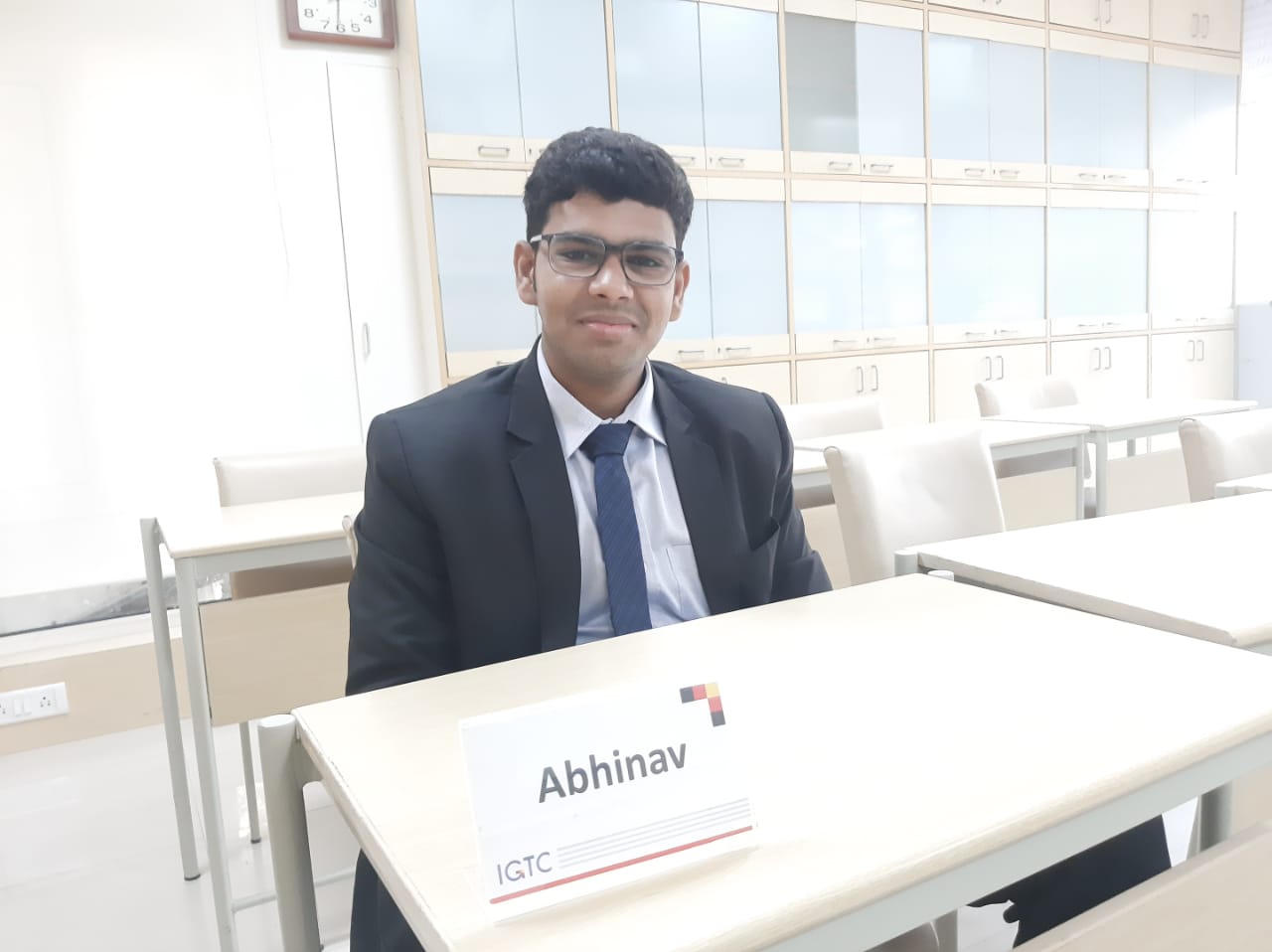
Management Trainee, Bosch Automotive Electronics India Pvt. Ltd.

As a supply chain and operations enthusiast, my training stint at Baerlocher Additives was a rich learning experience. I could apply statistical tools taught at IGTC to scientifically calculate minimum inventory levels, which helped in optimizing the inventory management systems. Despite the COVID-19 pandemic, I received a pre-placement offer from Baerlocher for a role in core operations and production planning. The sheer scale of complexity, dynamics and skillsets the current job demands is unparalleled, and a management course like PGPBA prepares you for such a role. I say with certainty that IGTC gave me a holistic cognizance to elevate myself in both my professional and personal life.
Chitrang Narkar
Operations Executive, Baerlocher India Additives Pvt. Ltd.
Some experiences in life encompass situations where routine interaction serendipitously leads to opportunities in your career. This statement came true for me, because my everyday actions reflecting integrity, values, trust and responsibility were keenly observed by my mentor, Radhieka Mehta. Before I knew it, I had made the transition from being an IGTCian to a valuable resource of the IGTC administration team, wherein I am going to be responsible for ensuring academic excellence and smooth delivery of the programmes. Now, my profile at IGTC has given me a greater purpose in life, wherein I can make a difference to many other lives. Being a young leader myself, I will now help groom the leaders of tomorrow!
Rashmi Rao
Executive, Indo-German Training Centre


My story begins in school; where I wrote a short article for the school weekly, a small drop box was my window to putting my thoughts in the most creative way; this small drop box has now transformed into the big canvas of Siemens Smart Infrastructure’s Corporate Management function. Over the years, I realized I was a communicator with a dream to work for an innovative organization, the opportunity came knocking at my door with one such organization that has been revolutionizing technology over 100 years – Siemens Limited! My job role allows me to be the bridge between the business and the world through content creation and communication. I am eternally grateful for the values IGTC has imparted, it has taught us to – aim for the stars while staying true to our roots.
Shreya Shah
Communications Executive, Siemens Limited.
From contemplating whether to interview with a company which required me to change my domain of expertise to admiring the people, processes and atmosphere of the company; GEP was the place to be. Over the course of my internship I executed projects given to me by the team and made it a point to gain an experience in sourcing as a function. By bid summaries to supplier management and strategic sourcing, I realised that the procurement industry was highly dynamic and strategic and that is where I wanted to be and grow. GEP has always been a people’s company and I am grateful to be part of this organization. I look back at my journey at IGTC and realize that the teachings imparted in the classroom prepared me for a corporate life at GEP.
Shweta Deshmukh
Senior Sourcing Analyst – GEP


Bajaj Allianz was my first step into the corporate world, my internship there allowed me to implement concepts like functional and emotional marketing through content creation and product sales. At IGTC I was surrounded by individuals with significant industry experience across verticals, and this gave me an opportunity to learn from them and to work with different teams on different projects thus allowing me to further build on my interpersonal skills. Working with BAGIC helped me realize that it was a people-centric organization which made me keen on continuing as a full-time employee. Due to my performance and the skills demonstrated at BAGIC, I was ecstatic when I was offered a role as Management Trainee. IGTC has helped me grow by imparting knowledge and inculcating in me the confidence to achieve this dream
Simran Gupta
Management Trainee – Bajaj Allianz General Insurance Co. Ltd.
German has been a part of my life since high school and working at Deutsche Bank has been a dream. I pursued my master’s degree and while working for a Financial broker, I came across IGTC and realised the road to my German Dream. Through IGTC I have seen myself grow professionally and personally. From living alone in a new city to working on a series of projects and assignment; finding opportunities to improve my analytical and soft skills. My internship at Deutsche Bank was the highlight of my experience at IGTC. The positivity and excitement at the company was infectious and this was topped with the support and guidance by our mentors. My elation increased multi-fold when I received an offer to continue working at DBOI. I want to thank IGTC for being the bridge to my dream, connecting me and my dream company.
Tanaya Dindore
Financial Analyst, Deutsche Bank of India

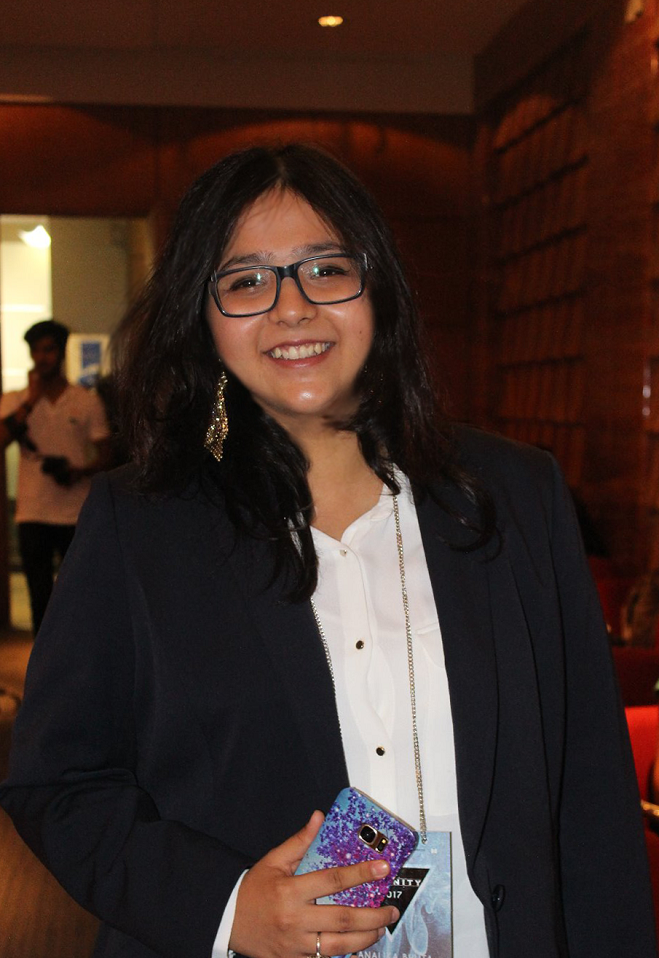
My journey started 13 years ago, when my father took me to VT Station to see the ‘Science Express’ organised by BASF. On the train I witnessed innovations of the future one such innovation I recall was a music system which identified songs when hummed. An hour later I decided that I wanted to pursue a career in science and one day I would work at BASF, the company responsible for my interest in science. My actions from that moment on were directed towards this goal and when I came across IGTC, I believe I had found the path. Discussions encouraged by professors along with innovative assignments transformed the way I thought. My internship at Merck Life Sciences Ltd. gave me invaluable industry experience, it allowed me to travel across the country and interact with customers. Each of these experiences helped pave the way to be selected by my dream company. I am immensely grateful to IGTC for helping me tick off the top-most item on my bucket list!
Vanalika Bhuta
GROW Trainee, BASF India Ltd.
Training with Siemens Ltd. gave me opportunities to work on diverse projects and a wider scope for learning and understanding the way businesses work. During my internship there I interacted with internal and external stakeholders for vendor development projects and this experience helped me to crack the Mercedes Benz interview for the Network Development department. I feel fortunate to be placed with Mercedes Benz as a Management Trainee and have fulfilled my dream of being a part of two most renowned German companies. Additionally by adhering and demonstrating the values of IGTC and Siemens Ltd. – Excellence, Responsible & Innovation I won the “Siemens Excellence Award”. This was truly a day to remember, “Thank you” doesn’t quite capture the magnitude of indebtedness that I have for all that IGTC has done for me.
Yashashree Borse
Management Trainee, Mercedes-Benz India Pvt. Ltd.

Emotions run deep when we look back at the journey of the last 18 months and IGTC is an experience that must be lived; a story that must be shared! As the batch stands at the brink of leaving IGTC, we can only urge them to break free from the shackles that constrain their minds.
We wish the graduating batch all happiness, prosperity and success; allow your dreams and ambitions to take flight and come to life!
Against All Odds…Dreams Remain Fulfilled at IGTC!
With this preparation, the IGTC team pumped in relentless effort to ensure that the rigorous IGTC learning journey culminated into a sustained career for every IGTCian. It was very important to maintain a transparent, fair and well-communicated process, across the 100 deserving graduating students. Morale and team-spirit had to remain high throughout all the emotional upheavals, not only posed by a tough and closed job market, but also by the severe physical and psychological impact of Covid’s 2nd wave. IGTC Director Radhieka R Mehta anchored the class together with determination, faith and positivity as they underwent a roller-coaster of experiences; a time of acceptances and rejections, failures and improvements, celebrations and disillusionments.
With the placement drive spanning from January to July 2021, IGTC stands proud of its outstanding record of having placed 92% of the students till date. This has only been possible due to an important stakeholder group: the IGTC Alumni, who not only continue to thrive and demonstrate phenomenal progress in the organizations, but also maintain true allegiance to their Alma Mater. One look at the placement statistics below will give you a perspective into the ensuing Joys@IGTC
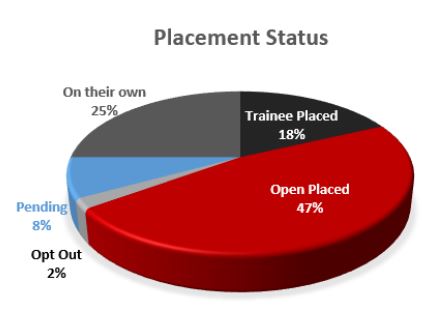

| Rank | Company | Students |
|---|---|---|
| 1 | Mercedes-Benz India Pvt. Ltd. | 7 |
| 2 | Siemens Limited | 6 |
| 3 | GEP | 4 |

| Rank | Highest Packages Offered by••• |
|---|---|
| 1 | DHL Express |
| 2 | BASF India Ltd. |
| 3 | Deutsche Bank of India |
| 4 | BrowserStack Limited |
| 5 | Drip Capital Services India LLP |
| 6 | Bajaj Allianz General Insurance Co.Ltd. |
With a successful placement season approaching its finale, IGTC is deeply grateful to all its Partnering Training Organizations for their steadfast support during such uncertain times. Recognizing talent, grooming young professions and providing a cornerstone to realize their dreams; these companies have done it all. Building careers…one dream at a time!
The PGPBA Batch 2019 – 2021 will go down in the history of IGTC for its resilience and endurance; a batch that has surmounted all odds, and we can only wish them the very best as they usher in a new phase in their lives; a corporate life!
IGTC: A Metamorphosis
“The beginning of a new month, the turn of a new leaf. The air of learning; the time of transition and belief.”
In September 2021, German precision and excellence combined with Indian agility and innovation, marked the commencements of the two flagship programmes at IGTC. Keeping all safety protocols in mind, the digitally and acoustically upgraded IGTC classrooms magnificently welcomed students in the physical mode, along with keeping an ongoing live-stream for the virtual audience.
The Post-Graduate Programme in Business Administration, Batch 2021 – 2023 was inaugurated on 1st September 2021, while the Executive Business Management Programme, Batch 2021 – 2022 was inaugurated on 4th September 2021. Both ceremonies commenced with the traditional lighting of the lamp followed by a short prayer to bless the learning journey. To ensure full participation from those on the virtual window, a provision was also instated to light the lamp virtually.
As a part of the induction to the PGPBA Batch, faculty Dr. Anita Bandyopadhyay engaged the students to understand faculty expectations from the batch. The simple hand clasp exercise highlighted that life was about to change and that change makes one uncomfortable and uneasy. Acceptance and a vision of new order will enable the class to readily accept challenges. In the second exercise, she placed various images on the floor in a spiral form. Students had a look at all the cards and pick 1 that they resonated the most with, in terms of their current feeling. Post which students were asked to talk personally with their batch mates and share why they selected the picture, how they felt and what has worked out for them in their life till date? This helped the students to understand each other better.
In the last activity, she explained the IGTC Spirit and Values though the concept of ‘when you flip two negatives, you get a positive’. Negative actions were to be deleted and final positive actions to be adopted were penned down by 12 groups on 24 colourful hexagonal cut-outs. The placement of these cut-outs resulted in the shape of a beautiful butterfly. Dr. Anita explained that the process of change will result in a lot of struggle, challenges and transformation, much like a butterfly undergoing metamorphosis. The IGTC journey is replete with ups and down, and constant pressure just like the larva in the cocoon. But finally, the promise is that they will all emerge and transform into butterflies.
As a part of the welcome to the EBMP Batch, IGCC Director General Stefan Halusa emphasized on the seniority of the IGTC faculty and the richness of content that makes him long to be student again. Faculty, Shuaib Fakih, Dr. Harkant Mankad, Dr. Suhas Rane and Rajeev Chawla also addressed the incoming managers and congratulated them on their decision to adopt a student life amid the bustling corporate life. The inauguration was followed by the first Economics lecture delivered by Dr. Harkant Mankad, who took the batch through the history of global economics.
With the hustle of students, managers and faculty back in class, the charm of IGTC is now back at its peak. With continuous learning and engagement, we hope that the nexus of knowledge, behaviour, skill and challenges fosters the educational environment further. We wish the new learners continued support and success during their journey at IGTC.
Dedication – Reflection – Celebration
Every accomplishment starts with the decision to try.
Between the end of 2019 and beginning of 2020, a group of 100 PGPBA students and 41 EBMP Pune managers took on the roles of learners at IGTC. An unrestrained journey; involving constant changes of various degrees at IGTC, collaborating with peers, exploring new perspectives and learning from their mistakes; they were really confronted with the precipice of life. However, with sheer resilience, they have truly evolved.
41 managers of EBMP Pune Batch 2020 scaled mountains to finally reach the academic summit on 3rd August 2021 at the Oxford Gold Resort, Pune. For the Certificate Awarding Ceremony, faculty Dr. Anita Bandyopadhyay engaged the graduating managers to reminisce their academic journey. She used a tree as a metaphor and symbol of growth and advancement to represent their experience with various dimensions encountered during the programme.
- The roots symbolise IGTC as an institute; the heart, soul and strength.
- The soil represents the IGTC Team; the anchors and nurturers.
- The trunk signifies the EBMP; the fortress and support system.
- The leaves embody the Faculty; the builders and drivers.
- The flowers denote fellow IGTCians; the learners and troublemakers.
The other prominent messages coming out of this activity included transformation, challenges, friendship, lifelong learning to capture a few. The highlight of the ceremony was the Victory Drum Circle: a Drum – Strum – Hum session, where the rhythm of the beating drums, the metallic jingle of the tambourine and the roars of joys marked their triumphant voyage.
The Post-Graduate Programme in Business Administration
Close to 70 students gathered personally at the Hotel Intercontinental, Mumbai while the rest joined online on Saturday, 7th August 2021 to witness the culmination of their 18-month PGPBA journey. With over 97% placed, every student’s face told a different story: stories of successes, triumphs, growth and hope for a brighter future. While all of them were overjoyed to finally receive their graduation degrees, the greatest underlying emotion was euphoria to meet their peers, faculty and the IGTC team.
The ceremony included the distribution of awards to the various student recipients:
- IGCC’s Dr. Günter Kruger Award for Excellence to Rashmi Rao and Yashashree Borse
- Siemens’s Excellence Award to Ronak Contractor and Yashashree Borse
- Bayer’s Championing Success Award to Mrunali Jadhav, Rashmi Rao and Vanalika Bhuta
- BASF’s Award for Business Ethics and Corporate Governance to Durgesh Kaushik
IGTC in its most personalized ceremonies invited the esteemed faculty to be Chief Guests, and give out the truly deserved certificates and trophies. The pride on the face of every PGPBA student and EBMP manager donning a cap and a gown was a sight to behold.
From engaging presentations in class to asking whether their voices are audible on zoom, the two batches have come a long way. The journey of the two batches ended here on an emotional yet cheerful note. The bond, affection and love continues forever. We wish all the students and mangers every success on their continued personal and corporate journeys.
IGTC Alumni Talks: An Electric Horse Meets a Diesel Dinosaur
“If I had asked people what they wanted, they would have said faster horses.” Henry Ford
Necessity often drives inventions, whereas imagination is the crucible for innovations. Today we are witness to a whole new phenomenon of Electric Horses galloping alongside traditional cars. Soon, these new Electric Horses will be operable as smoothly as the Next Gen Smartphone – intelligence and intuitive.
At IGTC we aspire to be phenomenal in everything we do and achieve. To carry on our spirit of real world learning, our host and Director, Radhieka Mehta invited our Alumni Mr. Magesh Srinivasan of Batch 1998-2000 to present his worldview on the upcoming Connected Car & Future Mobility industry. We had close to 130 participants of IGTC students and the alumni body.
With a unique topic: ‘An Electric Horse Meets a Diesel Dinosaur’, the story of the past, present and the future of mobility, found a curious and engaged audience amongst us. The discussions centered around the theme of ‘The Next Mobile is The Automobile’. This concept enraptured the audience and Magesh enthusiastically explained the basics of a software-defined car and highlighted the key insights for the benefit of the participants.
The In-Vehicle and Closed Loop Architecture: The mechatronic car of yesterday comprised assembled sub-systems represented by the acronym BICEPS: Body, Interior, Chassis, Electronics, Powertrain and Software was added recently to indicate the evolution of software defined vehicle platforms. As explained during the discussions, this new breed of software defined vehicles are evolving to mimic the Smartphone App ecosystem, that can be configured remotely via OTA (over-the-air) updates on in-vehicle embedded intelligence.
Branded Connected Services: Connected Cars, Trucks, Buses, 3-Wheelers, 2-Wheelers are increasing adopting TCUs (telecommunication control units) with built-in GPS modules that enable bi-directional flow of data between the Cloud to the Edge (vehicle). This provides opportunities to create, capture ad deliver value through Connected Service offerings to B2B and B2C use cases across all market verticals. Therefore, differentiation of vehicle OEM brands has shifted from hardware-based feature benefits to connected services-based delivery of unique experiences that enable real time and dynamic customer value. OEMs are transforming their Digital capabilities akin that of Google, Apple, Amazon, Uber, Facebook and Ola.
Business Model Innovation: Future of mobility and its growth is driven by Planet Action and the need to actualize Zero Carbon Footprint in human society. This will usher the need for integrated Multimodal Smart Mobility Solutions to move people and products from point ‘A’ to ‘B’. Furthermore, OEMs are likely to offer ‘product as a service’ to allow adoption of ‘pay per use’ and ‘pay per month’ subscription based service oriented mobility services that will ensure comprehensive fulfillment of mobility needs across B2B and B2C segments of the market. This will involve OEMs creating an ecosystem of collaboration with Insurance, Financial and Banking organizations to deliver a reliable connected experience: 24x7x365.
Q&A Session Highlights:
Dr. Harkant Mankad asked about, the long-term impact of the ‘Diesel Dinosaur’ going extinct. Disruption is Nature’s way to create new from the old, the 130-year auto industry is transforming into a software platform driven Future Mobility organizations said Magesh.
Another question that stood out was the challenge that faced this ‘electric horse’ and what should it be wary of? Unsurprisingly, the answer was the Big 5 tech giants. As Steve Bank mentioned, “It’s worth noting that everything – from the Internet to electric cars, genomic sequencing, mobile apps, and social media – was pioneered by startups, not existing companies.” This monopoly is both threatening and currently sheltering the newer waves of change.
Thus, with its challenges and its work all cut out for it, the automation revolution is set to find its way to the automobile industry. What eases this change? What greases its wheels? How much turbulence can we expect? As we progress further on this journey, we find out more about just how suited this ‘faster’ electric horse is to gallop ahead in the 21st Century.
Article contributions:
Magesh Srinivasan, IGTC Alumni 1998 – 2000
Anjani Miglani, IGTC PGPBA Student Batch 2021 – 2023
Nikhil Anandsekar, IGTC PGPBA Student Batch 2021 – 2023
Follow Magesh on https://www.youtube.com/channel/UCqfKefAlHMt8QdDkm5VgoyQ
Learning Beyond the Classroom
The German Dual System of Education has been the cornerstone of the IGTC Post-Graduate Programme in Business Administration (PGPBA). Internships, whether physical or virtual, play a significant role in the PGPBA curriculum, as the joint educational responsibility is shouldered by our Partnering Training Organizations in grooming young management talent into Corporate-Ready Professionals. Students gain an exposure to the organizational culture as well as magnified learning and networking opportunities.
After 4 months of intense curriculum at IGTC, the students proceeded for their 1st Practical Training Term from January to March 2021. Here are some sharings of their experiences:
“Integrating lean principles into digital transformation helps achieve radical simplification of the process. As an intern in Bosch Automotive Electronics India Private Ltd, I worked in the Strategic Planning team to study Inventory Visualization, Capacity Planning and set up appropriate standards for the processes. The current analogue process was converted to digital solutions to reduce the man-hours required.
The daily routine at BOSCH, starting with GEMBA walks, helped me to observe the shop floor’s operational reality, and allowed me to raise the relevant questions and work with the team on process optimization. I learnt one prime principle of operation management: Of course, data is important, but place the greater emphasis on facts.”
Chetan Chaudhari, Bosch Automotive Electronics India Private Ltd
“In my first internship, I was tasked with data analysis and market research about sales productivity. With the help of Visual Analytics tools learnt at IGTC, I was able to analyse and present the data to my reporting manager in the most effective way. It helped me to know my organization more deeply especially in terms of its products, the various functions and the operational branches. It also helped me to strengthen my analytical skills. In return, it also benefited the organization as they could draw out the volume of sales according to regions from the data submitted by me.”
Rahul Nair, Bayer India Pvt Ltd.
“I had the privilege of working with a team of financial professionals in the Accounting Close department supporting Private Bank Clients for Germany Head Office. I gained a profound understanding of daily cash and bank Monitoring, external audit support for disclosures process in term of preparing a summary of disclosure under IFRS and HGB GAAP and sharing working file with auditors.
I was also responsible for preparing Master Key Operating Processes for various disclosures as per International Financial Reporting Standards (IFRS). This was a novel task and served as an interesting learning for me.”
Shriya Kansara, DBOI Global Services Private Ltd.
“In today’s marketing era, products are designed and manufactured based on customer’s feedback. Post marketing surveys help us understand the proper positioning of products. As an intern at B|Braun Ltd, I conducted a market survey for a comparatively newer concept in the IV Fluids market, Balanced Crystalloids. My learnings from B2B Marketing and Business Communication helped me to establish the right network with the organizations’ clients and vendors. My learnings from Research Methodology and Market Research came to test while collecting and presenting the data to my mentor. This helped the company to understand the scope of IV Fluids in the market and the perception of the product in the minds of the doctors.”
Kanira Patel, B|Braun Medical India Pvt. Ltd.
“At Siemens, I was entrusted with packaging supplier transformation, by connecting new packaging suppliers, searching different vendor bases and raising Requests for Quotations (RFQs). I could communicate professionally with the new and existing suppliers to enhance the business network. It built my confidence and also helped the organisation source new suppliers. The practical exposure of Supply Chain Management helped me to relate further to the subject at IGTC in Term II. The different concepts such as Kraljic Model, Quality, Price and Service ratings have further enriched my knowledge and experience.”
Shambhavi Chalke, Siemens Ltd.
“In the Sales and Product Development department, I had the opportunity to explore the North-Eastern market, spanning Assam, Nagaland, Manipur, Tripura and Meghalaya, for the road construction equipment of the organization. I learned how to approach the right audience, the art of selling, showcasing appropriate market information, building and valuing new connections. The expectation was to gain a sense of the market and the positioning of its competitors along with assimilating as much knowledge as possible without worrying about targets.”
Siddhesh Phulaware, Wirtgen India Pvt. Ltd.
With every Partnering Training Organization giving their respective trainee the best corporate exposure, the students learnt to make the most of their most valuable internship experience, despite the pandemic. By learning and training under business mentors, the German Dual Education System flourished to give great benefits to both, the students and the organizations.
HR Partner Meet
‘Even the most resilient ones need to recharge themselves!’
Organizations and HR professionals have faced innumerable challenges and obstacles in the face of the raging pandemic. Amidst all the adversities there remains one crucial mission, ‘taking care of oneself, while taking care of the world around us. Even the most resilient ones need to recharge themselves!’ With this thought in mind, IGTC hosted the quarterly meet of the Indo-German HR Partner Forum on Tuesday, 18th May 2021.
With over 20 key HR professionals in attendance, the underlying theme for the meet was candid sharing, personal anecdotes and incidents on the following areas:
- One of my fondest recollections from the last one year.
- A new learning that caught my fancy and promises to stay.
- What I look forward to in the near future.
Some of the strongest sharing included building connections, retaining relationships, investing in learning, developing hobbies such as biking, running, singing and gardening, celebrating the small things in life. Meditating, yoga and spending time in prayer proved to be strong anchors of Mindful Living. From engaging in daily chores to sound parenting to strengthen the family bond, the HR Forum left us with one very important learning ‘Count your blessings, celebrate the good happening around you. Invest in yourself. It is ok to sometimes be selfish and take time out.’
Seeking new experiences during the pandemic also emerged as a strong theme during the HR Partner Forum Meet; exploring hybrid work solutions, engaging with connections using peer-to-peer app solutions, volunteering and assisting individuals affected by the Coronavirus, etc. The session closed with all the HR Partners feeling personally reconnected, despite not meeting in person, which will enable them to continue trusting and supporting each other professionally for the benefit of the Indo-German fraternity.
To know more about the activities of the Indo-German HR Partner Forum, please connect with Radhieka R Mehta, Director, Indo-German Training Centre on director@igtcindia.com.
Making sense out of economics
Dr. Harkant Mankad, the senior most faculty at the Indo German Training Centre (IGTC) Mumbai, conducted a one day training workshop for corporate executives with the theme of “Making Sense out of Economics – National and Global”.
The workshop, with the expressed take away to understand the complexity of economic policy and assess the alternatives of scenario for the economy in near and medium term, focused on the post pandemic challenges for the economy of India and of the world.
Economic growth was the result of spending by the consumer, creation of new capacities by private investors and by the government. The pandemic has adversely affected earnings, i.e., purchasing power and had caused 7.5% negative growth of Indian economy, and nearly 5% negative growth of global economy. Drawing an analogy from the stalled car, Dr. Mankad indicated how monetary and fiscal authorities are pushing the economies with cheap money, deficit budgets and increasing debt.
Cheap money policies of the central banks, including RBI, has heralded the regime of low interest rates, excess global liquidity, asset price inflation, and expansive public dent. Bond markets, always having significant role in monetary economics have moved to center stage. Through bond buying programs, central banks keep the interest rates low, push liquidity in the economic system, encourage borrowing by state and private players alike. A significant part of the liquidity has found escape in speculation on stock, money and commodity markets.
A debt bubble was brewing, high probability that a burst of the dent bubble in medium term would have the derailing effect on economies, like that burst of housing bubble in 2008.
On fiscal side, the governments have gone for deficit funding. The US has already spent or is committed to spend $7 trillion, over 8.5% of global GDP. With the US $ as the global reserve and accounting currency, expansion of supply of the US dollars is the cause for global inflation in general and commodity and stock price inflation in particular. In India, for understandable reasons, the application of FRBM (Fiscal Responsibility and Budget Management) Act discipline has been further moved to 2026 and may need to be moved to the end of the decade because of the fiscal needs of the second wave of pandemic.
In short and medium term, economies of the world, including that of India, will have to live with inflation and economic stagnation. Stagflation of 1970s may reappear nullifying the power of economic policies to have a positive impact on the direction of the economies. China by supply of cheap goods, provided inflation antidote for last 25 years. With Anti-China, pro-nationalist economic policies in the west and in India, disruption of China supply chain would put increasing pressures of inflation. It will hurt the other economies more than that of China. India will face both demand pull and cost push inflation.
In interaction with the participants, Dr. Mankad also discussed the prospect of select industries, of increased productivity and possible increase in unemployment by push that pandemic gave to IT and AI sectors, effects of policies of ‘Atmanirbhar Bharat’, aspects of foreign exchange rates and of the US dollar, and of energy insecurity of China. He concluded with his favorite quote, “Yesterday is history, tomorrow is a mystery, but today is a gift. That is why it is called the present.”
Learning through Culture’s Eyes
Culture hides more than it reveals and strangely enough what it hides, it hides most effectively from its own participants. Years of study have convinced me that the real job is not to understand foreign culture but to understand our own.
Edward T. Hall
The Indo-German Training Centre organized an Open Programme on ‘Intercultural Adaptors’, presented by faculty Mr. Jugal Choudhary on 2nd March 2021. An alumnus of Harvard Business School, Boston, he is accredited in Intercultural Management by The Hofstede Centre, Helsinki and, is a visiting faculty at IIM, Ahmedabad and Bangalore.
Our world is increasingly becoming interdependent on resources, services and products from far-away geographies. Differences in cultural values between nations have posed very significant challenges and have led to huge financial losses. These differences are hard to observe and are even harder to deal with. The traditional approach of providing ‘Cultural Sensitization’ to executives has major limitations.
Intercultural Adaptors are culture-specific tools, templates, structures and process changes that allow an effective connection across different cultures; much like an electrical plug-socket adaptor. These Adaptors are developed with the aid of well-researched cross-cultural frameworks and allow an individual to act in alignment with his/her native value system and yet communicate and collaborate seamlessly with individuals and systems from a different culture. Jugal’s unique approach of creating Adaptors to connect across cultures has been successfully applied by several global companies.
Two organizations ThyssenKrupp Materials IT Services India Pvt. Ltd. and Evolute Systems Pvt. Ltd. nominated managers to participate in the programme. These participants belonged to backgrounds as diverse as Information & Technology, Strategy and Software. Before the programme a pre-course survey was done with the participants; some of the key issues raised were:
- Communication gap between onsite and offsite teams
- Germans do not like our sugar-coated responses and instead ask for a lot of details
- Often behaviors are interpreted in unexpected ways
- It is hard to build trust with ‘them’
Through interactive games, role plays, case studies, videos, quizzes and presentations, participants learned about popular frameworks of cross-cultural differences and the concept of developing Adaptors. The participants couldn’t stop laughing at themselves when they learned about challenges westerners face when communicating with Indians.
The day-long cultural journey concluded with a presentation by the participants of actionable plans, for themselves individually and for their organizations.
The Chemistry between Ethics and Corporate Success!
BASF, the largest chemical giant in the world, took the PGPBA Batch of 2019 – 2021 on an unusual corporate expedition; one spanning 6 lectures. This journey familiarized us with the ethics and principles that are so firmly ingrained into the moral fabric of the organization.
Over the last 4 semesters, we had learnt in great detail the importance of corporate governance and values via our curriculum in various functional areas. The final milestone before graduation, was learning how to incorporate ethics in each of these functions from the BASF stalwarts. BASF India brought to light the importance of ethics and values through live examples and numerous case studies in areas like Marketing & Communications, Procurement, Legal & Compliance, Finance and Human Resources. BASF has now set high benchmarks for us in our personal and professional lives. Today, it is an undisputed fact that whenever every IGTCian thinks of Ethics, they will first think of BASF.
Opening lecture by Mr. Krishnamohan Narayan, Managing Director BASF India
The series commenced with an interactive session with Mr. Krishnamohan Narayan emphasizing the underlined principle that when a business is built on CORE values it tends to survive in the long run; as compared to companies that look for shortcuts and instant profitability. As a man of his word, he stood for ethics over profitability when asked to choose between the two. Business Ethics are truly tested when the contract rightly favours both parties signing the contract. Companies today must have a futuristic view and with the present environmental crisis following the compliance norms would be the only way to survive.
Marketing & Communication Lecture
Mr. Bhavik Doshi and Ms. Deepti Shetty in their opening remarks added that in the online space how a person or a brand communicates, effects the audience perception. This was demonstrated through Hindustan Unilever’s response to the Green Peace onslaught on their brand Dove; for harming the environment. Hindustan Unilever was tactful by not responding immediately while simultaneously taking required steps to become a more sustainable brand. This taught us how fragile a brands image truly is and sometimes it is better not to react as any further communication could be detrimental to the company. In contrast, today individuals prefer following faces associated with the brand rather than the brand itself; personal marketing is now taking precedence over brand marketing, and this is visible through the examples of Elon Musk, Vishal Sikka, Chanda Kochhar etc.
Legal & Compliance Lecture
This session focused on SEBI Regulations and the Code of Conduct presented by Mr. Pankaj Bahl and Mr. Pradeep Chandan. It began with an explanation of corporate governance encompassing stakeholders, communities, transparency, values, processes and practices followed by the organization. It enhances customer centricity, partnerships, shareholder value & community and environment responsiveness; companies have severely neglected their responsibility towards the community and the environment. CSR and corporate governance was brought into SEBI regulations; it remains a compliance as every individual has different integrity. This was demonstrated through the example of ENRON, where employees inflated financials and made fraud representations, resulting in bankruptcy in 4 years. Hence it is up to individual corporates to comply in order to sustain.
Procurement Lecture
The procurement session by Mr. Venkateswaran Srinivasan and his team made us introspect on our day-to-day behavior. The Kahoot activity gave us insights on how often we choose to be unethical when it comes to mundane tasks like following traffic laws or travelling in trains without a ticket. The team pointed that it is more likely to be unethical in the procurement department, here is where ethics are put to the test. Procurement deals with suppliers on a daily basis where cost and quality manipulation is most likely; the role play highlighted the importance of buyer awareness in such a transaction. A discussion on compliances by both internal as well as external stakeholders revealed that no matter how big or small a part of BASF you are, ethics always takes priority.
Finance Lecture
Ms. Meenakshi Mishra began with an explanation on the increasing financial scams in the VUCA world; a small change in a numerical can drastically alter the image of an organization for the worst. The Code of Conduct is essential especially for senior management; this helps to keep a check on individual ethical practices. The Code of Conduct governs Financial Reporting at the organization with respect to forex volatility, incorrect practices, misreporting, unauthorized transactions, outsourcing risks and fraud processes; and its associated policies. The Approval Matrix ensures zero unauthorized transactions, with the accountability lying with multiple managers.
Human Resources Lecture
The series concluded by Ms. Nalini Nutan and Mr. Samsundar Palaparthi addressing how the path to robust ethical culture begins with Human Resources. A company’s beliefs and values are truly tested in the face of pressure; this was explained using the Iceberg model which states that 80% of an individual’s behaviour is dependent on beliefs and values; 20% is based on skills acquired. They also highlighted the need for a whistle-blower policy for employee protection. We had the opportunity to analyze the mistakes that Jet Airways made and also learnt how the case would be different had the organization followed ethical corporate governance and cared for the staff that had displayed loyalty toward the organization for years.
Through this series we learned the importance of a detailed Code of Conduct which can answer questions that may arise amongst employees when faced with a dilemma. We also understood the importance of hiring individuals whose personal goals and values align with that of the company. It goes without saying, BASF left us with some unforgettable lessons that we will take ahead in our personal and corporate lives.
The end of the BASF lecture series marked the end of our time at IGTC and the start of our journey in the real world where these lessons will help us navigate our way to success.
All aboard the Learning Bus!
The Indo-German Training Centre’s Post Graduate Programme in Business Administration (PGPBA) has been a confluence of young minds for 3 decades now. However, learning took an online detour in 2020. Students from diverse educational, cultural and professional backgrounds who came together during this difficult year, were by no means hampered in their enthusiasm to learn. Despite being at home and studying only in a virtual space, they learnt to collaborate as a team under the expertise of world class faculties at IGTC and stumbled on a gold-mine of learning. Enlisted below are their diverse learnings and assignments accomplished in the first four months.
Fundamentals of Management: The Whole Nine Yards
Knitting a beautiful tapestry with the available fabric; Fundamentals of Management essentially wove the entire curriculum into a work of art. Learning several managerial concepts and theories like Theory Z, McKinsey’s 7s model, core competencies of an organization, corporate level strategies, value chain analysis etc., and connecting them with every subject at IGTC in order to make informed decisions.
Managerial Economics: Imaginative learning at its best
Managerial Economics helped move beyond traditional economics, and build a rational solution to obstacles faced by organisations with a 360-degree view of micro and macroeconomic concepts.
- Suggesting ways to improve the livelihood of the elderly in Toyama, Japan; a country with a disproportionate age demographic.
- Understanding the role of smart technologies in shaping the global future.
- Curating a financial newspaper for the year 2025 and predicting the scenario considering several PESTLE factors (political, economic, social, technological & ecological).
Marketing: Fish where the fish are
Beginning with the 4P’s of marketing, this module took us on a journey covering service marketing, brand equity models, pricing strategies, new product development, marketing communication and promotion strategies, B2B marketing, advertising, sales promotions, CRM
- Collaborating on a project and understanding various dimensions of marketing keeping in mind both B2B and B2C scenarios. The project concluded with a presentation on the marketing plan, tactics & strategies, SWOT and situational analysis, financial projections and finally idea implementation.
- Solving a number of B2B Marketing case studies along with a classroom discussion on the same.
- Assessing decision making units for different B2B industries.
Operations Management: A well-oiled machine
The founding stone of every modern business irrespective of their nature of the operation. The course is designed to understand key concepts like Theory of Constraints, Lean Manufacturing Techniques, Total Quality Management, and Toyota Production System in most simplified way putting customer at center of Operation management principles.
- Interacting through Case studies like Birmingham Machines, Federal Express and Nuclear fizzle to understand key concepts of operation.
- Learning and understanding companies on the recovery road in the aftermath of the pandemic.
Organizational Behaviour: A case of Creative Classwork
Organizational behaviour involves steering an organisation in the right direction, understanding and predicting organisational life, nature and activities. It highlighted ways to increase employee morale and studying group dynamics in the organizational setting, classroom activities involved:
- Evaluating yourself with various personality tests to understand behavior and concepts.
- Creating a case study on an assigned topic, probing its different aspects this was followed by an enactment and presentation of the case.
Human Resource Management: People & Culture
The subject aimed to dive deep into various aspects of human resource management and how it influences overall growth of the organization. Hiring Process, Competency Mapping, Target and Goal Setting, Employee Value Proposition etc. are some of the keys concepts covered in the course.
- Using the Mural app students were to enlist various factors affecting the organizational structure. This being a group activity students were required to contact an alumnus or a senior working/ training with a German company and study the organization structure of that particular industry.
- Converting the goal statements of an organization into SMART goal statements, based on various criteria
Finance & Accounts: In for a Penny, In for a Pound
Finance plays a significant role in the value chain of the enterprise. It starts with accounting and ends with financial strategy. A 3 tiered course allows for an understanding of this journey by creating ledgers, trial balance and balance sheets. Finance enables individuals and organizations design a course of action to control the costs. Subjects were taught using Microsoft Excel thus enhancing the online teaching-learning experience.
- Determining the performance of a listed company through the calculation and analysis of various financial ratios.
- Conducting weekly MCQ based tests via ‘Testmoz’ to revise learnings and to test understanding of the subject.
IT for Mangers: Think Big, Think Data
IT for managers aims to gives a combination of two very dynamic aspects of any business: Management Expertise and IT. The course allows student to explore various tools like SAP ERP, Emerging technologies like block chain, AI and machine learning to deliver the intended value leveraging IT technologies.
- Improving productivity, automating data processing and enhancing business performance by studying process efficiency in business.
- Gaining insight on how mangers can leverage technologies like Block Chain, Machine Learning and Robotics for making better-quality decisions through an understanding of Wood Energy and Rolls Royce Case Study.
Quantitative Methods: The Number Game
Understand the implications of the numerical solutions derived from statistical tools like mean, median, mode, standard deviation, binomial and poison distributions, hypothesis testing and its application to business use.
- Enabling descriptive, predictive and prescriptive analytics which is critical for any organization by studying live data from different sources and statistically interpreting them.
Research Methodology and Market Research: From Ground Up
Mapping out the profile of a customer using a structured process and analysis techniques. It helps gain valuable insights into several demographical information essential in creating a tailored marketing campaigns.
- Emphasizing various stages involved in a structured and scientific market research.
- Conducting secondary research for gaining critical insights into different sectors and providing recommendations.
- Modelling and interpreting publically available data sets, interpreting results and making statistically sound decisions with the help of IBM SPSS.
Visual Analytics: The Art of Storytelling
The intermingling of data analytics and visualization of information is at the core of Visual Analytics. With the right methodologies and accurate data representation viewing high volume data is simplified thus leading to swifter decision making.
- Preparing business data according to target audience, using methods like Complaint Received vs Processed, Attributes of Service Provider and Tier wise breakdown of clients.
Business Communication: The Power of Words
The dependence of individuals and organizations on the virtual space today has further emphasised the importance of communication. It aids in planning and decision making, facilitates coordination and establishes effective leadership.
- Pitching a start-up idea to prospect investors and laying down the quarterly plan for a year.
- Writing a report to the investor of the start-up, including a brief update of milestones achieved in the particular time period.
- Building networks, both formal and informal through various groups and influencers to promote the start-up.
The pandemic has posed a number of challenges in the online learning sphere, and with the close of the first semester, students are now gearing up for internships at the various training companies. Banking on the curriculum learnt, they are now confident to embark with renewed spirits and excel at their organizations. With 2021 being the corner, the PGPBA student now turn a new leaf, a corporate leaf.
Article contributed by Chetan Chaudhari, Harshita Maru and Pratik Anand, PGPBA Batch 2020 – 2022
Corporate to Classroom: Launch of 1st All India Executive Business Management Programme
Exceptional beginnings happen under the most unusual circumstances. At a time, when normalcy is still a desired reality, IGTC Mumbai aspired to work on an ambitious project of expanding its high-impact Weekend Executive Business Management Programme (EBMP), which was confined to a local Mumbai and Pune reach, to an All-India Executive Business Management Programme (EBMP) with a more significant demographical reach. By no means, this was an easy proposition, but then being phenomenal has always been the mantra at IGTC!
Bringing together managers from across the country and facilitating learning and growth, the All India EBMP Batch borrows from the accepted international block or modular approach; the programme spans 16-months divided into 6 blocks of 9 days each to be held every 3 months at IGTC Mumbai.
On 9th January 2021, IGTC opened its doors to 23 seasoned managers from Gurgaon, Jaipur, Kolkata, Rajkot, Bangalore, Nashik, Pune and Mumbai. It is inevitable to say that we created a ‘Little India’ under one roof at IGTC. The inauguration began with the lighting of the lamp. The batch was warmly welcomed with an address by Radhieka Mehta, Director IGTC. In his opening remarks, Stephan Halusa, Director General, Indo-German Chamber of Commerce attested the credibility of the IGTC EBMP and congratulated the managers on surfing the learning wave. Other speakers at the inaugural ceremony included IGTC faculties Shuaib Fakih, Boman Moradian, Dr. Harkant Mankad and Dr. Anita Bandyopadhyay along with many of the HR and Business Heads across the sponsoring companies. All of them endorsed the spirit of being resilient and overcoming the tough year 2020 and congratulated the managers on positively embarking on this journey of lifelong learning.
Since 20 were attending in person at IGTC and 3 of them were attending online, IGTC faculty and team had to deal with the complexity of delivering the programme in a hybrid mode. The first quarter of 9 days introduced the managers to four fundamental modules. Here is what was covered and what they have to say:
Financial and Cost Management by Mr. Shuaib Fakih
Concepts explanation began with basic finance concepts such as Balance Sheet, Profit and Loss Statements, Valuation Ratios, Equity and liability, Performance Evaluation, Profitability, ROCE, understanding the Annual Report. The faculty explained concepts relating it to live examples of Reliance Retail. Concepts learnt in the classroom were then applied to the Joy and Kwality assignment to test conceptual clarity.
Mr. Fakih had the most difficult challenge at hand, of teaching finance to non-finance professionals. The hallmark of a great teacher is to keep it simple, and avoid using the ‘jargon’. And the way he explained the financial topics, from a Manager’s perspective, was astounding. He maintained a bird’s eye view and regularly explained the context and relevance of different approaches like ratios and costs. The examples and the exercises were designed to make us think and evaluate different scenarios to be able to make better financial decisions.
Gary Chandy, Deputy General Manager – Marketing, Minda Industries Limited
Emerging Leadership by Dr. Anita Bandyopadhyay
A highly interactive session with an immersion into several human and corporate themes such as Organization Design & Structure, Strategy, Career Planning, Goal Setting, Performance Evaluation and the Appraisal Process, STAR Technique, Talent Management and Interpersonal Interaction. The Johari Window, an evaluation tool provided them opportunities for self-introspection and insights. The module ended with an assignment on Career Planning, to be studied in light of their current work environments.
“I expected a session on HR topics but I didn’t know that Dr. Anita Bandyopadhyay is a rare breed; she effortlessly combines her core strength i.e. HR with business sense. She explained how our SMART goals should help businesses to grow. With her flair and anecdotes, she made us reflect on our own values, our goals, our communication styles. She singlehandedly raised the self-awareness quotient of the group by more than a few points.”
Subhendu Kusari, Associate Manager, Voith Paper Technology (India) Pvt. Ltd., Kolkata
Marketing Management by Mr. Sagar Narsian
The Marketing module dived deep into concepts such as the Product Life Cycle, New Product Development, Product Value Canvas and Marketing Segmentation. Marketing Strategies, were discussed at length covering Concentrated Marketing, Differentiated Marketing, Undifferentiated Marketing and Custom Marketing. Marketing concluded with assignments on Consumer Research, PESTEL and SWOT analysis.
“Marketing is about ‘meeting customer needs and wants profitably’. And Mr. Sagar Narsian, is excellent at conveying this mantra and ensuring that we imbibe it. From precipitated silica to SCADA systems to manufacturing auto components to fax machines to FMCG, his knowledge in different industries and products was dumbfounding. Apart from marketing strategies and segmentation and product value canvas, topics like Buying Centre were an eye opening and will probably help us in closing deals faster.”
Dharti Rathod, Founder and CEO, Imark Consulting and Training, Rajkot
Managerial Economics by Dr. Harkant Mankad
Dr. Mankad left the batch stunned not only with concepts in macroeconomics but the history behind world economics. The first 2 days of the module took the managers into the major drivers of the modern economy, demography, technology, foreign exchange, digital revolution, political and migration crisis and of course his favourite topics of the Oil-Dollar battle, Globalization and the VUCA world!
“Candid yet profound, Dr. Mankad seems to have the world history and economics at his fingertips. He aptly narrates how seemingly unconnected events and causes on one part of the world leads to impact another geographically apart. From him, one can visualize the shape of the world’s future far ahead from the present. I loved his style of being so grounded in his perspectives and had a great time learning from him. Undoubtedly, he had the entire class engrossed in rapt attention.”
Krishnan CL, Deputy General Manager, Bosch Limited, Bengaluru
After this intense classroom experience; the managers returned to their professional lives with new perspectives and learnings that they will continue to observe, practice and integrate in their workplace. This defines the duality of the German Education System, which is the cornerstone of this learning experience. IGTC looks forward to next 16 months journey with the All India 1st EBMP Batch!
The cornerstone of the program, the vastly experienced faculty, exceeded my expectations. They broke down complex topics into easy to understand concepts with practical applications and made the learning fun. Their diverse experience meant we had a plethora of relevant examples from the industry. The IGTC team offered amazing hospitality to what is an eclectic batch of professionals from different industries and domains. I couldn’t have asked for a better start to the program. I am happy that I made the decision to join this program and I am excited about the journey.
Abhishek Gupta, General Manager, SMS India Pvt. Ltd., Gurugram
The programme is very practical and interactive. The faculty and support staff are exceptional, the engagement they have maintained since Day 1 is something that I was not expecting with an executive programme.
Prasad Nawathe, AVP – Research, Decimal Point Innovative Research Solutions, Nashik
This has been by far one of the best courses I have ever attended. The data provided to us is immaculate, clear and in-depth. Faculties keep us more engaged with relevant and real life examples which indirectly attracted our interest towards each module. Thank you IGTC.
Dipika Gavankar, Senior Digital Media Strategist, Pressto Drycleaning and Laundry Services Pvt. Ltd., Mumbai
TYFBA….Thank you for being Awesome!! A BIG thank you for taking care of us as kids!!
Sachin Hon, Senior Manager, Glatt Systems Pvt. Ltd., Pune
Article contributed by Abhishek Gupta, General Manager, SMS India Pvt. Ltd., Gurugram, 1st All India EBMP Batch 2021-2022

